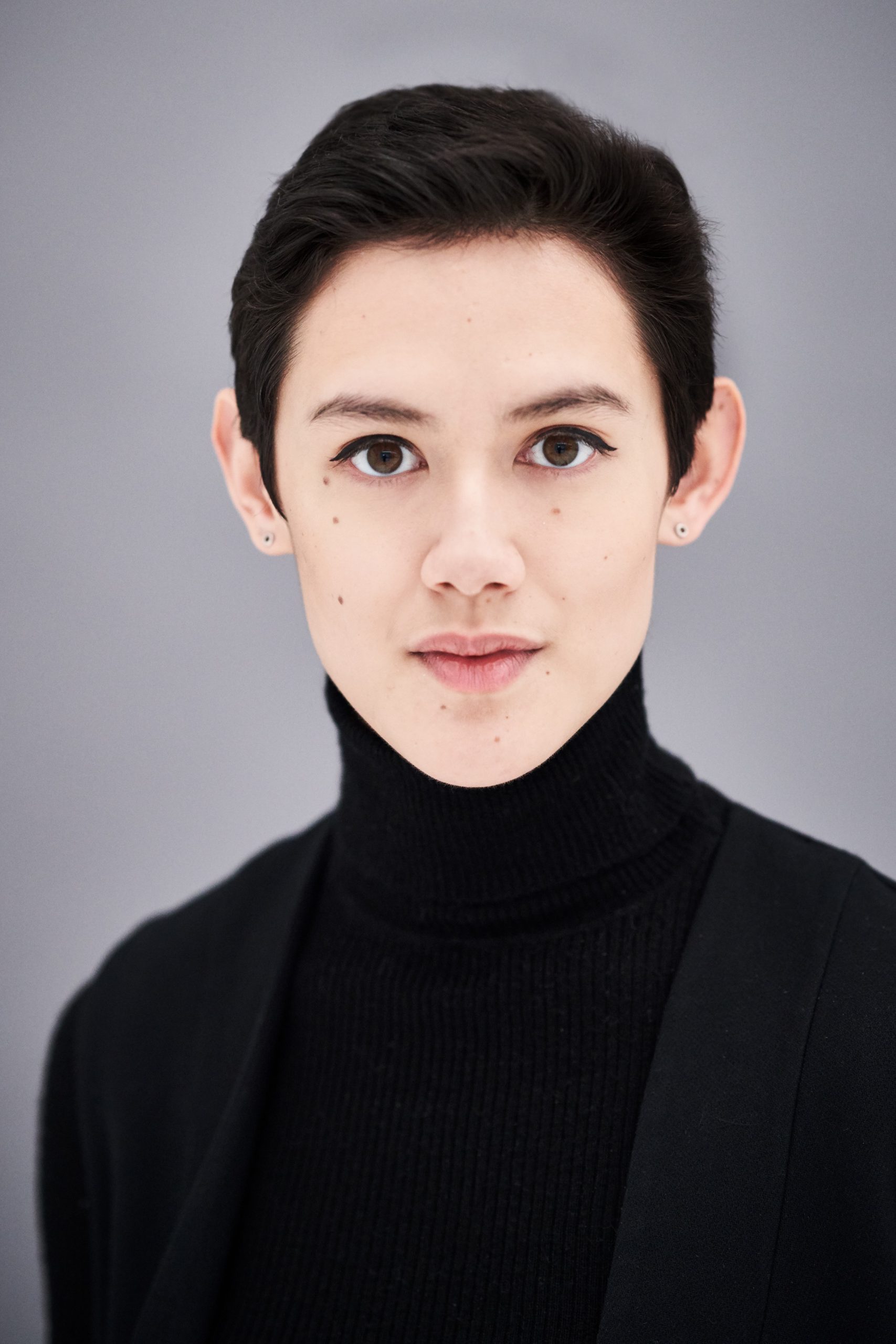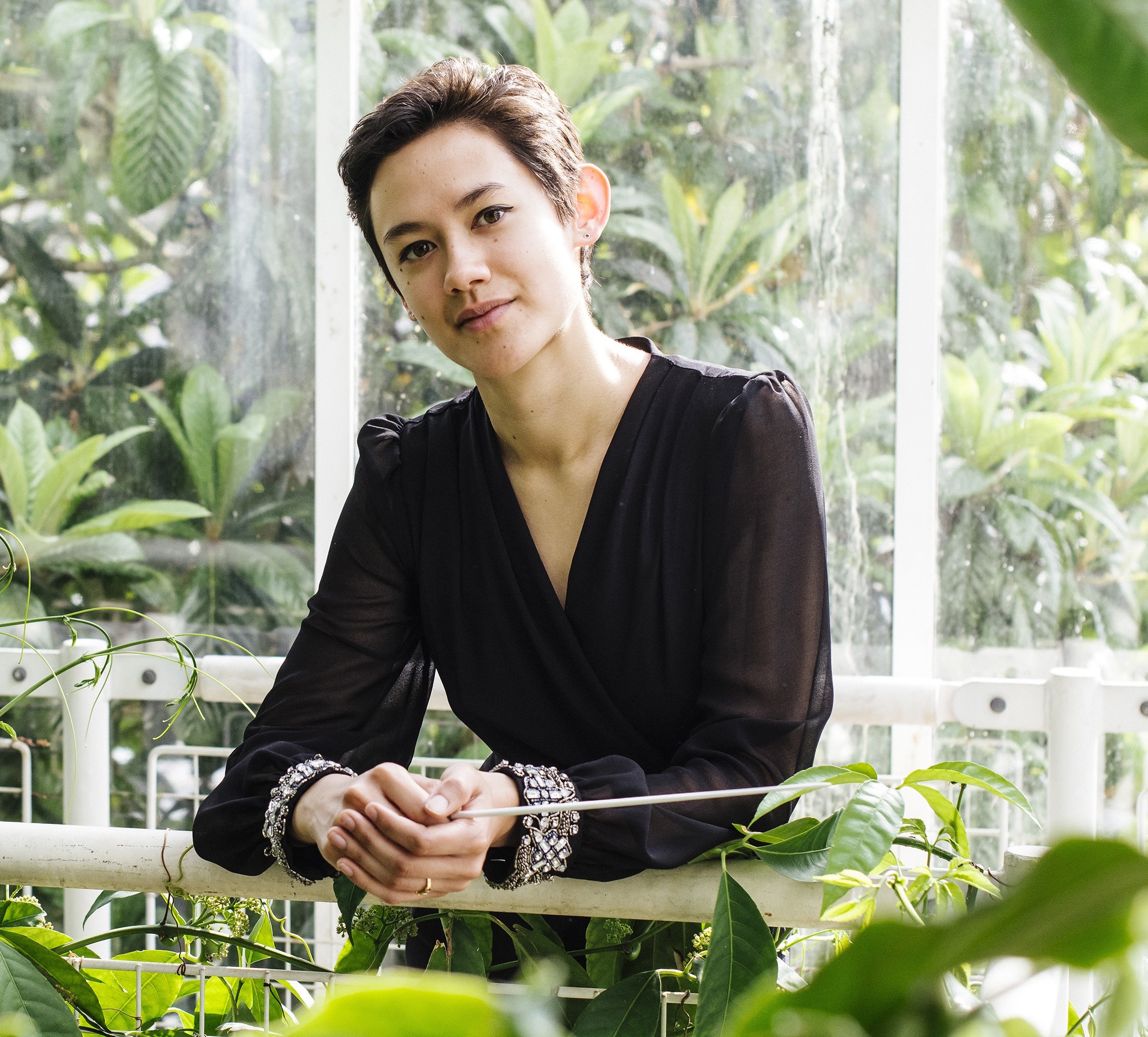People in the News
New Artist of the Month: Conductor Stephanie Childress
 The good fairies generously allotted the skills required to succeed as a conductor to Stephanie Childress. Or so it occurred to me while recently seeing this 24-year-old phenomenon in action leading a spirited, remarkably poised account of excerpts from Tchaikovsky’s Sleeping Beauty, beginning with “La Fée des lilas.”
The good fairies generously allotted the skills required to succeed as a conductor to Stephanie Childress. Or so it occurred to me while recently seeing this 24-year-old phenomenon in action leading a spirited, remarkably poised account of excerpts from Tchaikovsky’s Sleeping Beauty, beginning with “La Fée des lilas.”
This was one of several appearances in her inaugural season as associate conductor at the Idaho-based Sun Valley Music Festival over the past summer. By the time I visited midway through the nearly-month-long festival, Childress had already managed to establish a warm bond with the orchestra. Many of its members are seasoned players from such ensembles as the San Francisco Symphony.
“These connections that we make with the musicians around us are very precious,” Childress told me some weeks later in a Zoom interview from Paris, where she was heading into a busy fall, conducting the gala opening of the dance season at the Palais Garnier.
Indeed, she evinces a genuine sense of admiration and respect for her colleagues that, as I witnessed at Sun Valley, is clearly mutual. “We found we had so many things in common,” she recalls of her first conversation with Alasdair Neale, longtime music director at Sun Valley. “I treasure having these people with whom I can discuss scores and be open, musically speaking. And I hope that will continue for the rest of my life, not just as a young conductor.”
Childress says she looks forward to meeting more orchestras. “At some point, I’ll be ready for a music directorship. But for me, it’s not about having a title but about building something on a long-lasting scale with an orchestra.”
Just before heading to the idyllic spot in Idaho’s Northern Rockies where Sun Valley Music Festival takes place (and where all concerts are open to the public free of charge), Childress had concluded a three-year tenure as assistant conductor with the St. Louis Symphony Orchestra under Stéphane Denève. He has been an especially formative mentor: “my window into the world of American orchestras. We still have a really great friendship.”
A benefit of Childress’s new summer gig was the chance to reunite with several players from “my St. Louis family.” Like their colleagues from various other orchestras around the U.S., they are lured year after year by the enthusiastic audience as well as the gently spectacular beauty surrounding the main venue, an open-air concert hall. (Ernest Hemingway adored this landscape and absorbed it into his writing, making his home in nearby Ketchum for the last two years of his life.)
The eureka moment
Before St. Louis and Sun Valley, the notion of having a career partially based in North America seemed far-fetched to Childress. London, where she was born and raised, remains her home anchor—or at least the place “where I go home to do my laundry”—though the incessantly traveling conductor rarely finds herself there these days. Childress grew up in a non-musical family, but her French mother and British father made sure to expose her to the arts and encouraged her passion for swimming and ice-skating as well.
Seeing Nigel Kennedy perform The Four Seasons as a young child hooked Childress on the violin, which she took up at age six. “But for a long time, it was only a serious hobby,” she says, with characteristic self-effacement. The “eureka moment” came at 12 or 13 with a series of productions she saw at English National Opera: Billy Budd, Death in Venice, and Der Rosenkavalier. Childress suddenly knew that she wanted to be a conductor.
Determined to acquire a solid theoretical foundation in music, she earned a musicology degree from Cambridge while still in her teens and then took second prize at the inaugural La Maestra Conducting Competition in 2020. She maintains close ties with the music scene in France— Childress grew up in a bilingual household—but balances these with a strong affinity for British and German repertoire. While Childress has worked with a good deal of Italian opera as an assistant, conducting the operas of Strauss and Wagner is a primary goal.
This month sees her Hamburg Staatsoper debut with Abduction from the Seraglio. Childress also welcomes the opportunity to advocate for contemporary repertoire. She mentions her upcoming Detroit Opera debut in April 2024 with Missy Mazzoli’s Breaking the Waves as an especially exciting prospect.
 The response to her first season at Sun Valley proved so positive that Neale invited her to return for a second year in 2024. (Her predecessor there was Sameer Patel, a previous New Artist of the Month.) For Childress, the association with Sun Valley is “a lovely step further into the folds of the American cultural landscape.”
The response to her first season at Sun Valley proved so positive that Neale invited her to return for a second year in 2024. (Her predecessor there was Sameer Patel, a previous New Artist of the Month.) For Childress, the association with Sun Valley is “a lovely step further into the folds of the American cultural landscape.”
Finding the right mix
What’s the connection between Childress’s passion for opera and for conducting? “It’s to do with trying to create the drama that is unfolding onstage: as a conductor, you’re an architect, essentially, focusing on the ebb and flow of the music and how that serves the drama.” She adds: “It’s not about being at the center of it all. It’s about the challenge of reconciling all these various pieces of the puzzle.”
Childress finds opera to be “one of the purest forms of expression—a direct line from heart to heart.” It also offers intellectual stimulation for someone so keenly fascinated by languages and literature. She recalls immersing herself in Tchaikovsky’s Eugene Onegin to the point that she decided to learn Russian in grade school.
“Opera was the passion that ignited this crazy journey of conducting,” Childress says, which began with the violin, playing chamber music as well as in youth orchestras like the National Youth Orchestra. “I trained as a violinist, so I’ll never lose sight of my passion for symphonic music and the act of making music through a physical instrument.”
The ideal balance for Childress is a 50-50 mix of opera and orchestral work, which her calendar for the current season approaches. In both contexts, conducting offers a uniquely appealing outlet for her curiosity and collaborative instincts because “you have an eagle-eye view of everything.”
Childress also has the gift of expressing that view to the audience with stunning clarity and purpose. “I want to share what I do with as many people as possible,” she says, “especially nowadays, when classical music is struggling in the public domain and public consciousness. I am very passionate about the legacy of the art form.”





 FEATURED JOBS
FEATURED JOBS

 RENT A PHOTO
RENT A PHOTO


